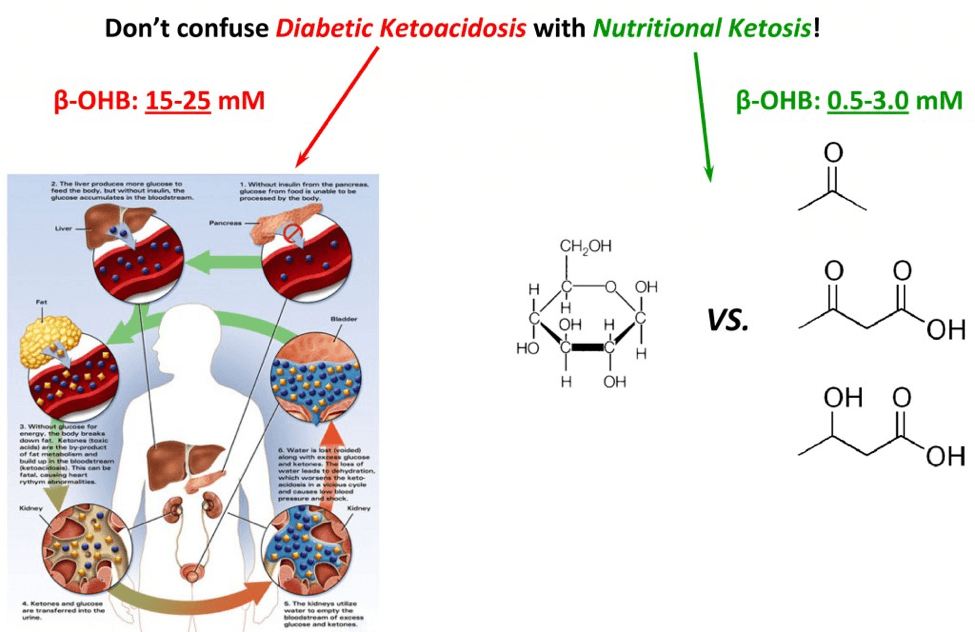You may have heard from your doctor that ketosis is a life-threatening condition. If so, your doctor is confusing diabetic ketoacidosis (DKA) with nutritional ketosis, or keto-adaptation.
First, some semantics. Our body can produce, from fat and some amino acids, three ketone bodies (a “ketone” refers to the chemical structure where oxygen is double-bonded to carbon sandwiched between at least 2 other carbons). These ketone bodies we produce are: acetone, acetoacetone, and beta-hydroxybutyrate (B-OHB). [For anyone who is interested, they are the 3 most right structures on the figure, below.]
Why do we make ketones? For starters, it’s a vital evolutionary advantage. Our brain can only function with glucose and ketones. Since we can’t store more than about 24 hours’ worth of glucose, we would all die of hypoglycemia if ever forced to fast for more than a day. Fortunately, our liver can take fat and select amino acids (the building blocks of proteins) and turn them into ketones, first and foremost to feed our brains. Hence, our body’s ability to produce ketones is required for basic survival.
What is diabetic ketoacidosis? When diabetics (usually Type I diabetics, but sometimes this occurs in very late-stage, insulin-dependent, Type II diabetics) fail to receive enough insulin, they go into an effective state of starvation. While they may have all the glucose in the world in their bloodstream, without insulin, they can’t get any into their cells. Hence, they are effectively going into starvation. The body does what it would do in anyone – it starts to make ketones out of fat and proteins. Here’s the problem: the diabetic patient in this case can’t produce any insulin, so there is no feedback loop and they continue to produce more and more ketones without stopping. By the time ketone levels (specifically, beta-hydroxybutyrate) approach 15 to 25 mM, the resulting pH imbalance leads to profound metabolic derangement and the patient is critically ill.
But this state of metabolic derangement is not actually possible in a person who can produce insulin, even in small amounts. The reason is that a feedback loop prevents the ketone level from getting high enough to cause the change in pH that leads to the cascade of bad problems. A person who is said to be “keto-adapted,” or in a state of nutritional ketosis, generally has beta-hydroxybutyrate levels between about 0.5 and 3.0 mM. This is far less than the levels required to cause harm through acid-base abnormalities.
Keto-adaption is a state, achieved through significant reduction of carbohydrate intake (typically to less than 50 grams per day) and moderate protein, where the body changes from relying on glycogen as its main source of energy to relying on fat. Specifically, the brain shifts from being primarily dependent on glucose, to being primarily dependent on beta-hydroxybutyrate. This has nothing to do with what a diabetic patient is experiencing in DKA, but does illustrate how poorly informed and quick to react the medical community is. DKA and nutritional ketosis (or keto-adaptation) have as much in common as a house fire and a fireplace.
Photo by Andrew Yardley on Unsplash








Hi! I was wondering, if a LCHF diet affects your thyroid (in a bad way of course) I´m on my 4th day eating this way and today I was reading regarding this issue, I take 50mg of levothyroxine daily, and so far I´m feeling great, although I ´m very afraid that in the long term, this diet is going to be dangerous to my thyroid.
Thanks!!
Any “diet” can impact thryioid function, especially if weight loss is involved.
Type 1 diabetic here. Just got lectured up and down during my last visit to the Endo because my blood ketone level was 5.2 mmol. Apparently, I’m lucky to not be in the hospital fighting for my life. I try to eat a lot of fat in my diet (and did that morning), and there’s probably too much protein. Now my blood sugars are relatively under control; my A1C is 6.4, could be better but the doctor insists on me taking 40 mg simvastatin which I know for a fact keeps my glucose higher than it would be otherwise. In their stern frenzied lecture, they mentioned something called euglycemic ketoacidosis, which I was unaware of. I always thought the ketones didn’t matter as long as I was taking insulin and the blood sugar was steady.
Any comment on that condition? Should I be worried if my blood sugar is okay but the ketones are that high?
I’ve ready case reports of it in both T1D and even non-diabetics, but not an expert in this.
Hit and run articles like this: https://www.livestrong.com/article/509787-ketosis-late-menstrual-cycle/
must really tick you off!
Peter,
What are your thoughts on recent conversations regarding the “dangers of the ketogenic diet”?
I am a Type II diabetic not responding to treatment. I take 6 mg glimiperide, 120 units lantus, 1.8 Victoza and getting ready to start Actos. My numbers are almost always in the 200’s and often in the 400’s.
I asked to go on the Atkins diet and go off some insulin. I thought maybe if there were no carbs to metabolize, I could have a break from all of the insulin. My doctor agreed because she was at a loss.
I’ve reduced my drugs. Although some 200’s, most numbers in 135-150 range.
Your paragraph concerns me:
“By the time ketone levels (specifically, beta-hydroxybutyrate) approach 15 to 25 mM, the resulting pH imbalance leads to profound metabolic derangement and the patient is critically ill.”
How do I know if that is happening to me? How to prevent that?
This is rare in patients with T2D, but you can check your ketone level.
Keto for 7 months, did a 70mi bike ride, next day full head and torso rash, red , looks like the rash I get when I’m sick. Day 3 post ride and rash is getting worse. I did supplement lots of potassium to ward off cramps. Had a few first night, took more potassium and feel ok. Rash is concerning me. Any ideas.
hello Dr. Attia,
wanted to ask you about this concern i’ve been investigating and have not found a decent answer in all these KETO blogs,
so i’m in keto, doing atkins, since im a person that weight lifts and does cardio, i eat a lot of protein since MY MAIN GOAL IS TO PRESERVE MUSCLE AND LOOSE ONLY FAT, i dont want to gain muscle, i just DONT WANT TO LOOSE IT, i know eating the right amount of protein is the way to go to preserve muscle, should I eat the protein before hitting the gym? to preserve muscle mass, or just take BCAA? or LEUCINE? which one would you recommend best to preserve muscle mass? since there are some aminos that are NOT KETOGENIC i dont want to get kicked out of ketosis state, what would you recommend? do you think taking bcaa would kick me out of keto? or leucine?
THanks
I’m an active exerciser and do about 100 minutes of cardio a day and 30 minutes of weight training. I started a kerogenic diet about 2 years ago foot injury precluded running and my PSA, which had been about .02 for 7 years since my treatment (surgery + radiation) started to go up eventually getting to .14 as I recall. With going Keto it went down to .019. My diet is nuts, tofu, natto, salmon, 6 oz of the following vegetables – broccoli, spinach, mushrooms, kale, peppers and squash with 2 oz of olive oil. I eat one meal a day at the end of the day. I have 2 concerns. 1.
When I measure my ketones at the end of the day the reading is 6.7 or higher, with glucose 50 to 70. It goes down to about 4.5 right after and around 2.2 in the morning. Is this high a glucose reading a concern? 2. Is there any evidence that the effect of this diet on PSA levels dimishes over time?
Thanks.
Hi Dr. Peter Attia,
i am 14 years old boy. i don’t have diabetics. i was overweight then i lost 12 kg on high carb diet, but now i can’t lose weight. my weight is 60 kg and my height is 165 cm. i want to make ketogenic diet, but i am worried about keto-acidosis .my question is “only the people with diabetics have keto-acidosis or anyone can get keto-acidosis ?” and
“some people say that going on the ketogenic diet for than 6 months is dangerous, but i found that Dr. Stephen D. Phinney said that it is a lifestyle” which one is true ?
Hi Dr Peter
My grandson one and a half year old went to pediatric , he detected a fruity breath, decided to test the blood and urine and found high sugar and ketons, is there a possibility this could be a dietary cause, kid eats pasta, rice and potatoes most of time?
Thank you for your attention
Cecilia
Hello Peter,
I have been in Keto after watching your TED talk in preparation for a major surgery, posterior thoracotomy to remove a large benign tumour. I lost weight, reduced inflamation, felt great before the surgery, I have had my operation, and been out of keto for nearly three weeks, I am currently healing well and doing my physio. I want to know if it is dangerous for me to go back into keto while I am still recovering and if anyone has any idea when is a good time to go back into keto after recovering from major surgery trauma?
I have searched everywhere on the net and found nothing more than anecdotal evidence from a few forum users who have said they have been through what looked like minor surgery/anesthetic in keto, and others where the consultant said it was dangerous and wouldn’t perform the surgery while the patient was in ketosis.
I am not asking direct medical advice, just an average benchmark or what you would consider safe post surgery.
Thank you very much for everything you do.
Lee
Hi Peter,
Thanks for your website. Hoping to get your views on a question. I am a 9:30 – 10:00 hour Ironman athlete. I have been experimenting with ketogenic diet for 3-4 months. I train with a powermeter on the bike and pace on run and have noticed an elevated HR of around 10 beats across zones, and wondering if that is a normal response. Perceived effort is slightly higher. But otherwise I feel great. Is the higher heart rate typical? Thanks, Hamish.
Yes, many people report this, especially in the first 6 to 12 months. I’m guessing some combination of volume depletion, incomplete fat adaptation (and glycogen depletion), and/or electrolyte imbalance. I regained aerobic capacity in 3 months, but not threshold capacity until 12-18 months! Clearly a longer investment than most would consider.
Hello..
Just found your blog and I’m trying to get a better understanding of this. I recently started a new diet that consists of no carbs (I am allowed 4 melba toasts a day), no sugar, no dairy and no oils paired with 500 calories daily, coming from 2 meals containing a protein, vegetable and fruit (all of which are very limited). The diet also consists of some supplements as well as 8oz of alkaline water daily. I recently went to a med express thinking I had a UTI but when tested, they found a level of ketones equaling 8.9mmol/l. The doctor tested my blood sugar and came back with a reading of 87 (and I had not eaten yet that day). She was very concerned saying that I was starving myself and am causing kidney damage that could turn into ketoacidosis. From all the research I’ve been doing my ketones levels seem higher than anything I’ve read about and I’m unsure of what to do. This diet has been successful for me so far (I lost 8 pounds in 10 days) but I’m unsure as to if my ketones levels will decrease as time goes on or not. Any advice you have would be greatly appreciated.
Hello Peter,
I was wondering if one can use the ketogenic diet to treat homosexuality. I commented in this thread not finding a better place. You are very analytical and a doctor, so what do you think of this? The calorie restricted ketogenic diet significantly lowers sexual desire. If coupled with dark therapy (no artificial light) and sexual activity restriction, it would bring the sexual life of a homosexual to a halt. If upon re-introduction of carbs and increase of calories the homosexual has physical intimacy with the opposite sex than he/she can again have heterosexual desires. Once these desires are fulfilled the homosexual desires will gradually disappear (although this may require years, during which time he/she will be a bisexual). In the same manner the ketogenic diet can be used to treat all paraphilias. I am studying psychology and one day I may try this with volunteers. What do you think?
Rita –
I am also a doctor and also analytical . What you are proposing is not a good idea . Homosexuality is not a condition that needs to be treated . Please go out and really meet more gay or lesbian people – they are people too! They are not not ill or broken. Get to know some of these folks – really know them as friends ( not in any type of therapeutic relationship) and you will understand. Even better, search through your own family, that is blood relations, and I promise you will find someone who is gay or lesbian. Make an effort to meet them on some sort of equal footing . Then, you will come to understand , as I did, that a gay or lesbian person is just that , a person. Not a patient because they are g/l.
There is a whole new world of friends for you to meet !!!
Michael
You do realize it is 2015 not 1815.
How is it possible that I can be alive in a time when someone who is supposedly smart enough to earn a doctorate in something is still living in the dark ages.
Very informative. Thank you.
What about constant high level of ketones (urinary test) when I am not diabetic ? I have started a keto-diet trois weeks ago and went on ketosis after three days. Since that, apart from two or three episodes of low levels of ketones I am constantly at 8mmol or higher (and the blood level is maybe muche higher !) and do not know what to do to lower the ketosis. Eating some fruits made the things better but not long. What can I do excepting stopping the diet and going back to carbs ? Should I increase the lipids or reduce them ? Increase the proteins ? The carbs ? Eat more ?
Is it possible that my body can’t use ketones properly but continues to produce more and more to provide me with sufficient energy ? I don’t feel particularly tired, I drink a lot of water, my urinary pH is a bit low but not so much (between 6 and 7). I take complements (vitamins, minerals, potassium, etc.) and eat lots of green vegetables, herbs, etc.
(I should have re-read my post. Lots of mistakes, sorry… I meant “three weeks ago”, “maybe much higher” “not for long” and some others… I am not english mothertongue as you’ve certainly noticed !)
I should add that I suffer from Hashimoto.
Dr Attia, I just left a supplement store upset because the girl working there asked me, “Do you know the Consequences of Keto Diet?” I didn’t even ask her opinion on it, I just wanted Amino Acids with no carbs added. She went on to tell me her boyfriend almost died after introducing carbs back into to his diet. He apparently was retaining too many fluids and it wrecked havoc on his kidneys. I asked her why would he go back to eating high carbs anyways? She said his cardiologist told him it was very bad for us. I’m thinking he must have been a Type 1 Diabetic??? I also asked her to have a discussion with him on his diet while living a Ketogenics lifestyle. I have a feeling he was not telling her the truth or his Cardiologist. I will not let her bring me down. I’ve been in NK for weeks now. I even blood test a few times a week and test my Glucose 2-3 times a day. I feel great and have more energy than I did before starting. Just a few questions. First, I’m not T2D even though it’s in both sides of my family, I was gestational with first if 3 children, my first child is T1D since age 11. My average 30 day Glucose is 90. How important is it to be 70-80 average along with being in NK? It’s been 3 months since I started my new way of eating and I was stating around 67 fasting to 87 high. Now it’s never that low, even after weight traing and cardio. Last, I’m 47 and I feel great 2 weeks before my menses, but week of and week after I feel like I did on high Carb Diet. Major fatigue, depression and painful joints. I do all the vitamins and minerals religiously. I also drink 2-4g broth a day. Any tips on hormones balancing out on a Ketogenic Diet?
I hate to have my first question be about alcohol but where does alcohol fit in the ketosis/diabetic/weight loss. Does a drink of straight spirits interfere with ketosis. How does it effect BG, (mine generally goes down if I have two drinks) in general, and aside from the obvious calories contained in alcohol what does a drink or two a day do to weight loss.
While I am at i,t in moderation, 2-4 ounces of straight spirits a day would have what kind of effect on overall health?
I have lost 40 pounds on a ketogenic diet, with fasting BG dropping from 275 to 90-11- and A1C dropping from 9.5 to 6.5 in a three month period. I also use intermittent fasting up to 7 days worth. Thanks for all the information contained here.
Dr. Attia,
Hello. I would like to thank you for the wealth of information on your site. I appreciate the amount of time you spend educating the viewers.
I am in my early 40’s, and diagnosed with type 1 diabetes in ICU seven years ago. Also, my grandmother was type 1. I have been told that I am a “brittle” diabetic due to my being “insulin reactive”. I generally eat a low-glycemic diet, almost no grain carbs with one serving of fruit per day. Protein from meat/eggs/fish/nuts is up to 25 grams per meal. Vegetables are four to seven servings per day. I exercise by brisk walking 30-60 min’s, five days per week. Blood sugars generally range from 50 to 300. I am tired after seven years of constant sugar level swings (lowest-33, with symptoms), 15 lb. weight gain, muscle weakness, very little ketone issues-generally, etc..
My Diabetes Educator is well versed in type 1, and has done all she knows to do-says I am not a “textbook” type 1. Have seen the Endocrinologist, but he practices the mainstream treatment of “intensive insulin therapy”. I have read the “pink panther” book form front to back, and am well-versed on type1 as well as type 2. I am not looking for you to “treat me” per say, just wanting information as to the Ketogenic Diet and whether there is a possibility of it assisting my blood sugars in being more stable (already taking low dosages of Lantus and Humalog to prevent three to four lows a day). Any information you could give me would be greatly appreciated, and, if possible, the name of Nutritionist versed in Diabetes or doctor that specializes in “Nutritional Medicine” who has a practice in the state of New Mexico, then I would double my appreciation and thanks.
Sincerely,
Lynette Wommer
Lynette, you may want to see, or at least read the book by, Dr. Richard Bernstein. He’s just outside of NYC, if that’s feasible.
You stated in the article that you cannot fast for more than a 24 hour period. I am confused. I know of many people who have fasted for 10 days or more. What am I missing?
Thank You,
Tammy
Nope, pretty sure that’s not what I said. You can fast for a long time.